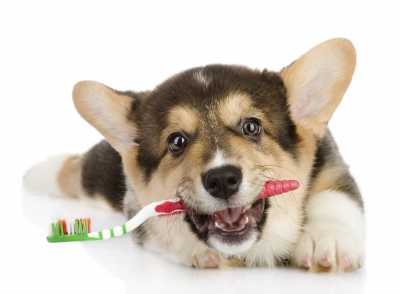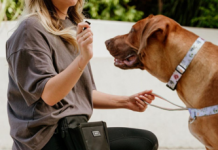Gum disease, in both humans and dogs, carries more risks than just problems in the mouth. Dog’s teeth build up plaque just like ours do. Left untreated by regular brushing, plaque will harden into calculus, or tartar and is the major cause of bad breath in dogs. Plaque and tartar on the teeth first cause inflammation and, if left untreated, leads to pain, eroded gums, tooth loss and what vets call “pathologic jaw fracture,” which results from bone loss in the jaw from gum disease. Just a little pressure on this weakened bone can easily fracture your dog’s jaw.
Gum disease in dogs spreads illness far beyond the mouth, however. Bacteria can spread into the bloodstream, causing heart disease and a host of other problems, including liver and kidney disease.
Reference: Things To Know About Good Dental Health For My Dog
Can I Clean My Dogs Teeth at Home?
You can and should brush your dog’s teeth and gums at home at least 3 times a week to remove plaque before it hardens into the more difficult to remove calculus. However, human toothpaste contains fluoride and should not be swallowed by you or your dog. You can purchase a toothpaste made especially for dogs. If your dog’s problems have progressed to the more serious periodontal disease, you will need to brush every day, as well as some other things as prescribed by your vet.
Pet stores carry brushes made just for dogs or you can brush with your finger using a terry cloth rag or gauze. It is only necessary to clean the outside of the teeth, as the inside will be cleaned by the tongue. Be certain to clean well where the gum and the tooth meet to remove any build-up. You may see some bleeding, but this should clear up with regular brushing as the harmful plaque is cleaned away.
What can I do to Prevent Gum Disease?
There are products on the market especially for cleaning the teeth like Cheweez and Dentabones. Dry food helps to scour off build up. If feeding canned food, give your dogs some hard dog treats, like Milk Bones.
In addition to brushing your dog’s teeth regularly at home, your dog should have his teeth cleaned professionally beginning around age 2. You should take your pet in at least once a year for regular exams, x-rays, and cleaning. Because the vet needs to check under the gum line rather than just checking the teeth, your dog will be sedated to allow the vet to check for periodontal pockets, which are pockets below the gum line where food has become trapped and leads to infection and inflammation.
To the Vet or a Pet Dentist?
Your vet can check and clean your pet’s teeth, but you may want to opt for a veterinary dentist if your pet has a severe problem with gum issues. Vet dentists are specially trained in oral care. A veterinary dentist can provide any and all care your dog needs related to the mouth, including surgery. You may be referred to a veterinary dentist by your regular vet if your pet has a serious case since a veterinary dentist can provide comprehensive care.
The oral health of your dog is just as important as your own. Lack of dental care can lead to many painful and sometimes dangerous conditions. Make sure your dog gets the care he needs and deserves.
See Also: Preventing Gum Disease In Senior Dogs
Photo Credit: Thinkstock













[…] do not realize how important it is to brush their teeth, yet it is. Just like humans, if you do not brush your dog or cat’s teeth, food and plaque will build up and can lead to gum disease. Did you know over 85% of dogs suffer […]